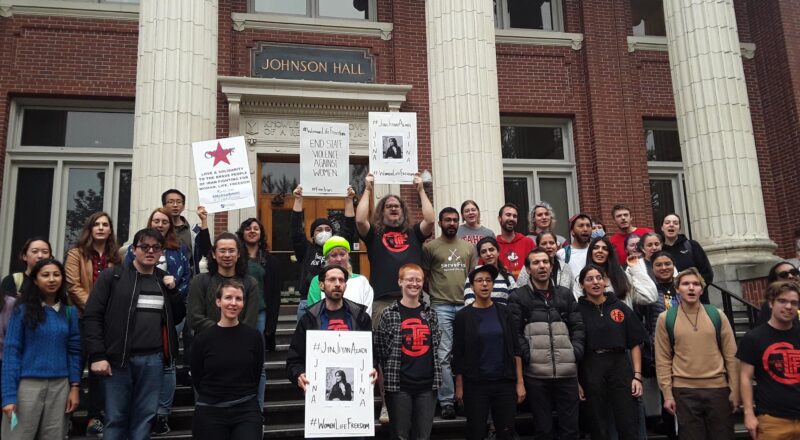On Friday, Oct. 7 at the University of Oregon campus, members of the UO community rallied outside of Johnson Hall in solidarity and remembrance of those killed in ongoing protests in Iran. Since the death of Mahsa Amini on Sept. 16, at the hands of so-called morality police in Iran, protests have surged in the Islamic Republic. Over two-hundred protesters have been killed by government authorities, many gunned down when security forces fired live ammunition into large crowds of protesters.
Now weeks into the largest protest in Iran since 2009, many UO community members worry that the western media has largely ignored this emerging women’s movement. There is even wide frustration that the media has failed to voice the name of Mahsa Amini whose murder sparked the uprising. Amini’s initial arrest by Iranian morality police was precipitated by her supposedly improper donning of a hijab (a head scarf covering women’s hair, which is legally mandated by Iranian authorities). After her arrest she was severely beaten and later died of a heart attack and possible stroke upon admission to a hospital.
Anger and rage over Amini’s death has spread across Iran and been led by women who are now removing their hijabs en masse and continuing to protest despite a brutal government crackdown. Amid the protests a slogan has emerged: “Women, life, freedom.” On the streets of Iran its is heard in Persian: Zan, Zendegi, Azadi زن، زندگی، آزادی and in Amini’s own Kurdish: Jin, Jiyan, Azadi.
“Women, life, freedom: is a philosophy, is against hierarchy, is against state authority, Is against capitalist exploitation of the environment,” Says Sanan Moradi, a UO grad student who has spoken many times about Kurdistan and has advocated for the Rojava Revolution & Kurdish Freedom Movement.
Moradi sees what is going on now as largely a feminist uprising in Iran and considers it a radically transformative movement, “people are done with reform in Iran.” He also made note of how over half of Iran’s prisoners are Kurds and was brought to tears when he said, “The criminal Islamic Republic has built its power on the bodies of women and minorities.”
Another speaker from the campus community Zeinab Nobowati urged the audience to consider, “What is solidarity from inside the imperial core?” They spoke on how the right to learn your own language is brutally repressed by the Iranian regime and even how the songwriter Shervin Hajipour was jailed for a popular protest song “Baraye.”
Further ideas such as women’s led resistance against a capitalist regimes and the search for a future of feminist solidarity were broached at the rally. These contributed to a prevailing sentiment of anti-capitalism and anti-patriarchy throughout the gathering. On a local level the organizers promoted participation in the Eugene Women’s Revolutionary Committee and encouraged attendees to continue engagement on such issues.
Discover more from Solidarity News
Subscribe to get the latest posts sent to your email.
